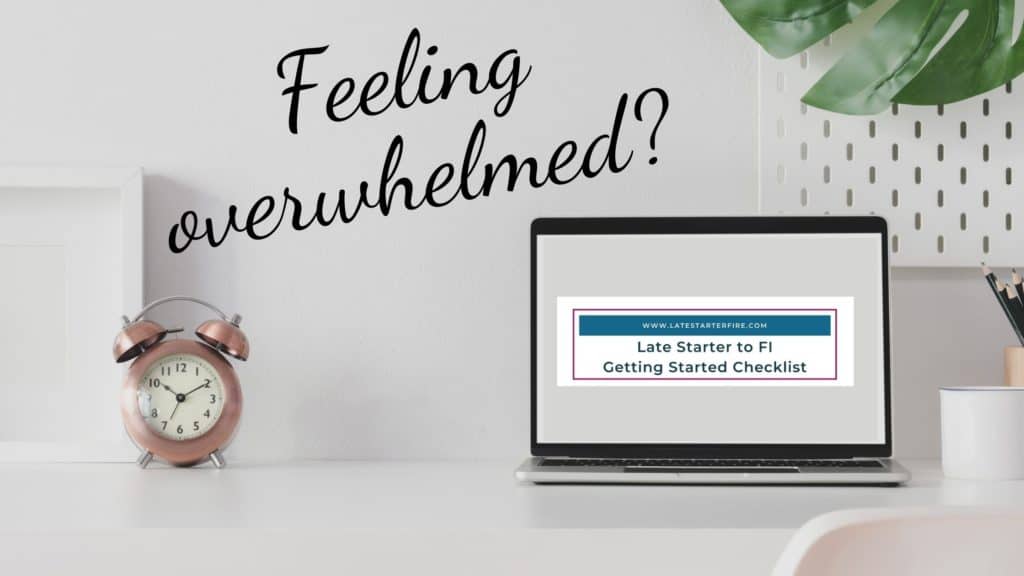Welcome to the Late Starter to FI series!
I am a Late Starter – I did not discover FIRE (Financial Independence Retire Early) concept until I was 47. This was way later, I thought than others who seem to have it all together in their 20s and 30s.
Since I started to write about my own journey, I have discovered there are many more Late Starters like me, yay! It is such a relief knowing I am not alone.
I want to share our stories, our unique perspectives and show that it is absolutely not too late for us.
So in this series, I particularly highlight those of us who start our FI journeys in our 40s, 50s and 60s. And explore questions such as ‘where do we start’, ‘can we still retire early(ish)’, ‘what are the specific challenges for us late starters’. We look at our past, not to castigate ourselves but so that you can learn from us.
Please join in the conversation in the comments below. I encourage you to share your story if you fit the profile of a late starter. You absolutely don’t have to be a blogger or podcaster to share your story.
Please email me at info@latestarterfire.com or connect with me on Twitter, Facebook or Instagram
And if you’ve missed any previous stories, you can catch up here – Late Starter to FI series
Today, we meet Ben, a blogger and podcaster from FI After 40 – where he writes about his journey from being a financial sh*tshow to becoming a resource for others in the same boat. (Edit – Sadly, Ben has taken down his blog)
You can connect with Ben on social media at @Fiafter40 – Instagram, Facebook and Twitter or email him at fiafter40@gmail.com
Take it away, Ben!

A little bit about me
I live in New Hampshire, USA, in the same town I grew up in. I also lived in Boston, New York City and Los Angeles when I was younger, after college. I have worked in Higher Education for about 16 years, mostly in College Admissions and Financial Aid. I currently work for a college that has a large online population.
I have two children – my son just turned 10 and my daughter will turn 8 in August. I love being outside and staying active. Also a big sports fan! I love all the professional Boston teams (Red Sox, Patriots and Celtics).
My relationship with money
Like many people, my relationship with money was established during my childhood. My parents didn’t really talk about money much and it was definitely a point of conflict for them. I remember saying to myself as a kid, “I don’t ever want to fight with anyone about money.”
That attitude affected me in a couple of ways:
1) it made me non confrontational in general and
2) I avoided dealing with money stress specifically.

Feeling Overwhelmed?
Use this FREE Checklist to start your journey to Financial Independence
Lifestyle inflation and debt
I grew up being someone who just accepted the fact that I’d have debt and would never be rich. I set a lot of unnecessary barriers around my self worth.
After getting married at age 30 and having two kids, my poor financial habits started catching up. We sold our first home and lost money to move to a bigger home when our second child was on the way.
Both homes pushed us further into debt along the way – updates, upgrades etc.
My marriage was slowly deteriorating for a number of reasons, with financial stress being a major contributor.
My lightbulb moment
Fast forward to about 18 months ago, when I was 42. My wife and I became separated which triggered a lot of deep self-reflection. I was spending a lot of time listening to various podcasts to try and get my mindset in a good place.
I stumbled across the Bigger Pockets real estate investing podcast for the first time which was one of the first lightbulb moments for me. I had become very focused on getting myself into a better place financially and the idea of pursuing real estate really resonated.
I spent the next year obsessed with the idea of buying a multi-family home so I could house hack (live in one unit while renting out the others).
Last summer my divorce became official and we sold our house. This netted me enough money to pay off the majority of my debt. At the time, I owed about $46 000 between credit cards, a personal loan and my car.
While sale profits made a huge improvement in my debt and credit, I still didn’t have enough money to buy my own property. I eventually came to the conclusion that I really needed to focus on paying off my remaining debt and saving some money before buying a multi-family home could be a realistic option.
That’s when FI goals came into focus.

On the path to Financial Independence
I started listening to FI podcasts like ChooseFI and the Mad Fientist. I also started reading FI blogs like Mr Money Mustache and Financial Samurai. These helped to motivate me to make some serious changes.
In the last 4-5 months I’ve done the following:
1) Paid down my debt to under $10 000 (between a car loan for $7500 and a credit card with $2500)
2) Started to contribute to my personal retirement plan through a 403(b). Up to this year, I had just let my employer contribute 9% of my annual salary to a 401(a) on my behalf, something I’m fortunate to receive. My goal is $8000 this year out of my own pocket.
3) Researched the best investment options and shifted most of my retirement over to index funds. I have about $58k right now and it’s mostly equities (VFIAX, VEXAX and VTIAX) with about 8% in bonds (VBTLX). The market crash hasn’t scared me much since I’m in it for the long haul. But it has been a real education for me since I really wasn’t paying attention until a few months ago.
4) Put together a three phase plan to get myself to early retirement over the next 12 years or so. It consists of me getting to the point where I’m maxing out my retirement as some of my expenses fall off (child support/alimony). I’m aiming to gradually get my saving rate from 0% to about 50% over that span of time. If all goes well, I can retire by 55 (still early, technically).
5) During this quarantine I’ve really tightened up my personal budget. For example, I’ve cut my total food spending down to under $300 this month, when I used to average about $600+ just for groceries. I’ve realised how reasonable it is to live on a legit food budget. I’m definitely not starving!
Challenge or advantage of starting late
Starting this journey late has added some additional challenges in some ways. For example, I have less time to build up my wealth compared to if I had started in my 20s. But I also think I’m in a position where I can make up a lot of ground.
My salary is good and I don’t have a mortgage. So in the end, I don’t think the late start is holding me back from living my best life.
My Why of FI
Overall I feel good about the direction I’m headed. To steal from one of my blogs, I know there is a better version of me out there. That’s really what I’m searching for.
“I’m starting to see the ‘best me’ version show up more and more. Not every hour, or even every day. I’m still very much a work in progress. But I can feel it happening. I see it in how I handle this pandemic. I see it with how I interact with my kids. I see it in what I dream about at night.”
– Revealing My WhyFI Password (Edit – blog post not available anymore)
What's next?
Good question! Here’s what I am focused on at this point:
– Paying down my remaining debt and establishing an emergency fund by the end of the year
– Getting to a position to purchase a multi-family home (duplex/triplex) so I can live in one unit and rent out the others
– Increasing my retirement contribution each year in order to reach $150k in my fund by 2023
– Continue connecting with people through the podcast and blog. I’d like to become a resource for other people who are getting started on the path to FI later in their lives, similar to what Latestarterfire has done!
Back to Latestarterfire
Thank you, Ben for sharing your story.
Once again, we are reminded that lifestyle inflation and going into debt to fund our lifestyles has further consequences down the road. Not dealing with our finances head on then compounds the problems.
I am amazed at what you have achieved on the path to FI in 4-5 months plus blogging and podcasting!
I struggle with my food budget too even though I cook the majority of my own meals. Spending on unhealthy food such as chips and ice cream has definitely gone up during this pandemic for me. Thanks for reminding me to rein it in and that one can eat very well on less than $300 a month.
I also love that as you pursue FI, what you are really searching for is a better version of yourself. And that you are well on your way to the ‘best you’.
We are all cheering you on!



